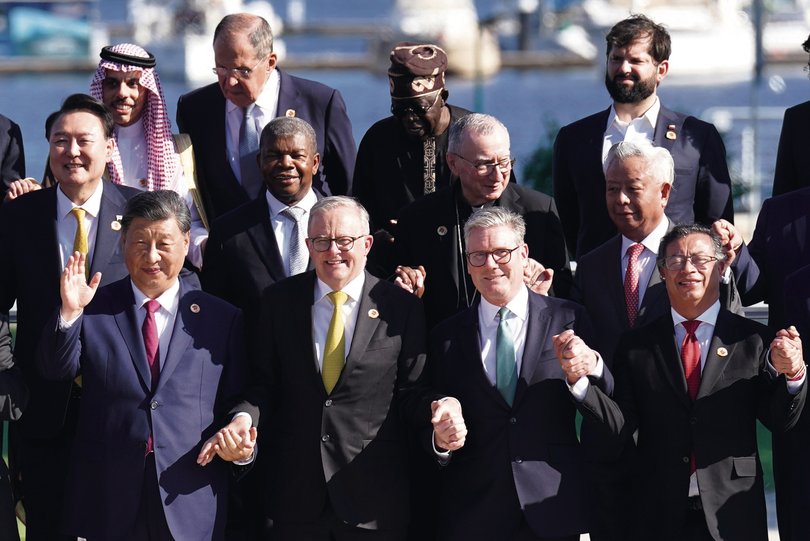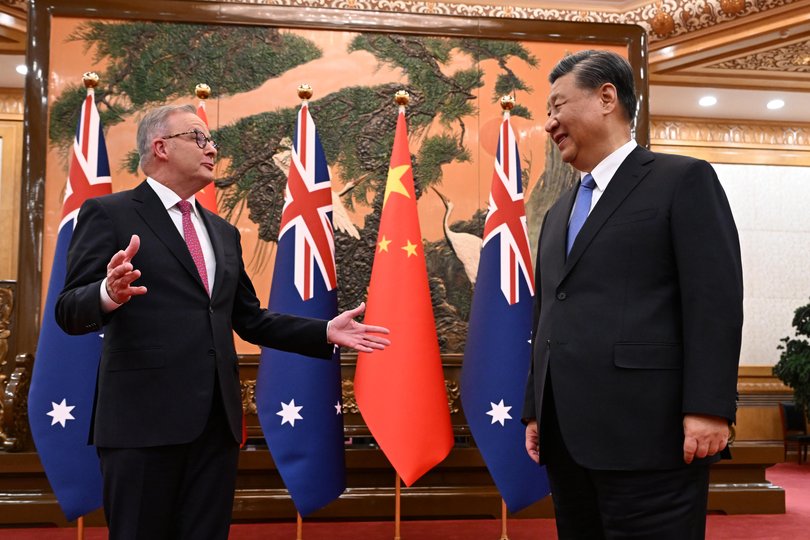NICOLA SMITH: Albanese must back up tough talk with hard conversations in Beijing
NICOLA SMITH: Anthony Albanese must be careful to show this tough talk on defence and the national interest cuts both ways.
The Prime Minister’s speech invoking the memory wartime leader John Curtin to assert Australia’s sovereignty in foreign policy decisions will likely resonate well with an electorate sceptical of Donald Trump’s vagaries.
But as he embarks on a lengthy tour of China and expected direct talks with Chinese President Xi Jinping, Anthony Albanese must be careful to show this tough talk on defence and the national interest cuts both ways.
Mr Albanese used the 80th anniversary of the death of Labor Prime Minister John Curtin at the weekend to subtly underscore that while the alliance with the US remains Australia’s most important security partnership the Government will not blindly follow Washington’s lead.
Sign up to The Nightly's newsletters.
Get the first look at the digital newspaper, curated daily stories and breaking headlines delivered to your inbox.
By continuing you agree to our Terms and Privacy Policy.He highlighted the risk taken by Mr Curtin in standing up to British and US leaders Winston Churchill and Franklin D Roosevelt to block the deployment of Australian troops to Burma, leaning into an Australia-first strategy to save thousands of lives and protect the homeland.

Mr Curtin’s leadership showed, “confidence and determination to think and act for ourselves. To follow our own course and shape our own future,” Mr Albanese said.
The notion of Australia being subservient to US foreign policy is one that prime ministers have strived to avoid since John Howard was labelled Washington’s “deputy sheriff” in the early 2000s – an unflattering term that was arguably more favourable than the jibe against Tony Blair as George Bush’s “poodle.”
Mr Albanese’s efforts to distance Australia from over-reliance on the United States may hit a chord with the public which, according to a June Lowy Institute poll ranks US President Donald Trump just below Russia and North Korea in terms of leaders they trust the least.
But while stressing Australia’s right to forge its own path in the world, Mr Albanese quickly pivoted to social issues, the concept of fair wages, pensions, affordable medicines, educational opportunities.
All worthy and necessary domestic goals, but a speech that began with a wartime scenario and laser focus on national defence did not address the basic question of whether the Government was doing the essentials to secure the nation.
It’s a challenge the Coalition and multiple independent security experts say the Government is struggling to rise to by sticking doggedly to its goal of raising defence spending to 2.33 per cent of GDP by 2033 and failing to plug shortfalls in vital capabilities.
Among them, former home affairs secretary Mike Pezzullo, who in December penned his own analysis of Prime Minister Curtin’s legacy and lessons for modern day Australia in a commentary in the Strategist, run by think tank, the Australian Strategic Policy Institute (ASPI).
“To honour Curtin, we have to widen the lens and examine the totality of his thought and policies, and then ask ourselves what a modern-day Curtin would make of our precarious strategic environment (said to be the worst in 80 years), and what he would do about it,” he wrote.
Mr Pezzullo argued that “a modern-day Curtin would be vocal about the threat posed by China. He would argue for greater defence self-reliance, and for at least 3 per cent of GDP to be spent on defence.
The late prime minister would be concerned about the threat of a “long-range missile and air attack, offensive cyber strikes, raids in remote areas, attacks on undersea infrastructure,” he said.
A modern Curtin would champion self-reliance but also recognise the need for a new ‘look to America’, an Australian-led standing headquarters for ANZUS and support AUKUS while focusing on a more rapid acquisition of military capabilities and boosting local defence production.
China received only one direct mention in Mr Albanese’s Curtin speech, when he talked up Labor’s efforts to “patiently and deliberately” stabilise Australia’s relationship with its largest trading partner.
Few details have been released about the Prime Minister’s upcoming trip to China, but Beijing is already setting its own narrative and making its aspirations known, with Chinese ambassador Xiao Qian penning opinion pieces back-to-back in two of the nation’s most high-profile mastheads.
Writing in The Australian last week, Mr Xiao warned Canberra against bowing to demands to increase its military spending, which he said would inflict a “heavy fiscal burden” on the national budget.
He did not explicitly refer to a US request for Australia to lift its defence spending to 3.5 per cent of GDP, but the underlying message was clear that China views this call for a larger military budget with suspicion.
As he heads to China, Mr Albanese must also be firm in his own signalling on defence, that Canberra does not set its budget according to political pressure from Washington but because of its own interests in doing so in the most dangerous strategic environment in decades.
This would also, no doubt, resonate with the public.
Last month’s Lowy Poll on Australian attitudes to the world, showed that while 72 per cent of respondents showed little confidence in Donald Trump, 71 per cent shared the same view of Xi Jinping.
In his second commentary piece in the Australian Financial Review on Monday, Ambassador Xiao indicated Beijing may try to capitalise on trade troubles with the US by expanding an existing free trade agreement with Canberra to include artificial intelligence and the digital economy.
It’s an offer on a sensitive policy area where wary security analysts and business leaders have urged Mr Albanese to also hold the line.
Deepening cooperation on AI and digital tech was risky as Beijing pushed to monopolise these sectors and concentrate control over critical supply chains and standards, said James Corera, the director of ASPI’s cyber, technology and security program.
“Unlike coal or beef exports, where alternative markets can eventually be found, dependencies in AI are far harder to unwind—and the stakes are much higher,” he said.
His colleague, senior analyst Fergus Ryan, warned that AI systems trained and tuned inside China came embedded with content moderation reflecting CCP values and a view of AI as “an instrument of social stability and ideological compliance.”

Andrew McKellar, CEO of the Australian Chamber of Commerce and Industry, has also urged a “cautious” approach to deeper cooperation.
The Nightly understands the Government has no plan to forge a deal on AI during Mr Albanese’s visit to China.
The hesitancy to do so or to utter comforting words on defence spending may be diplomatically awkward with Beijing, but if the Prime Minister, like Curtin, is to pursue a “foreign policy anchored in strategic reality,” these are the difficult conversations he must be prepared to have.

